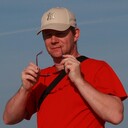0 Likes
Roxana Fazeli is graduated from Tehran Markaz Architecture & Art University with a bachelor's degree in Photography. Her latest solo show Masmoor at Shirin Gallery in January 2019, highlighted the human footprint on the lives of two near-extinct species rhinos, and Whales. By achieving more experiences working with mixed media, she uses "Papier-mâché" and industrial waste that humans throw away. As she says:" The most compiling subject that I'm investigating in my work was the daily destruction and raping of nature by humans with the excuse of technological achievement. The effect of our actions on mother nature and planet earth forced me to step into this. watching documentaries, photos films and listening to podcats have played an essential role in shaping my artistic view and what you see now.
In ancient civilizations, animal species have been highly regarded and respected, clearly shown in all mythical and artifacts. The superhumans and humanoids have been having an appearance and characters of human and animal species. Totems have been the sign of power and stamina and created with a combination of human- animal species. The Greek and Persian mythical, legendary creatures are strong evidence of this. These legendary creatures have been part of many other ancient civilizations such as Assyrians, Egyptians, Indians, and so on (for example, unicorns, mermaids, sphinx, etc.). Now by looking at the current situation, the result of technological and industrial progress, and all garbage produced by humans affecting our environment, I took this challenge to magnify the damage on the environment; I took this challenge to overstate the damage to the environment and all the species from different angles and point of views. I have been trying to show the following in my work:
1. The evolution of certain species to survive in this new environment.
2. The usage of old tools and waste in my sculptures.
3. The metamorphic changes of the species expressing the harmful effects of humans on nature and Themselves.
...





Overview and HistoryTehran is the capital of Iran and the largest city in the Middle East, with a population of fifteen million people living under the peaks of the Alborz mountain range.Although archaeological evidence places human activity around Tehran back into the years 6000BC, the city was not mentioned in any writings until much later, in the thirteenth century. It's a relatively new city by Iranian standards.But Tehran was a well-known village in the ninth century. It grew rapidly when its neighboring city, Rhages, was destroyed by Mongolian raiders. Many people fled to Tehran.In the seventeenth century Tehran became home to the rulers of the Safavid Dynasty. This is the period when the wall around the city was first constructed. Tehran became the capital of Iran in 1795 and amazingly fast growth followed over the next two hundred years.The recent history of Tehran saw construction of apartment complexes and wide avenues in place of the old Persian gardens, to the detriment of the city's cultural history.The city at present is laid out in two general parts. Northern Tehran is more cosmopolitan and expensive, southern Tehran is cheaper and gets the name "downtown."Getting ThereMehrabad airport is the original one which is currently in the process of being replaced by Imam Khomeini International Airport. The new one is farther away from the city but it now receives all the international traffic, so allow an extra hour to get there or back.TransportationTehran driving can be a wild free-for-all like some South American cities, so get ready for shared taxis, confusing bus routes and a brand new shiny metro system to make it all better. To be fair, there is a great highway system here.The metro has four lines, tickets cost 2000IR, and they have segregated cars. The women-only carriages are the last two at the end, FYI.Taxis come in two flavors, shared and private. Private taxis are more expensive but easier to manage for the visiting traveler. Tehran has a mean rush hour starting at seven AM and lasting until 8PM in its evening version. Solution? Motorcycle taxis! They cut through the traffic and any spare nerves you might have left.People and CultureMore than sixty percent of Tehranis were born outside of the city, making it as ethnically and linguistically diverse as the country itself. Tehran is the most secular and liberal city in Iran and as such it attracts students from all over the country.Things to do, RecommendationsTake the metro to the Tehran Bazaar at the stop "Panzda Gordad". There you can find anything and everything -- shoes, clothes, food, gold, machines and more. Just for the sight of it alone you should take a trip there.If you like being outside, go to Darband and drink tea in a traditional setting. Tehranis love a good picnic and there are plenty of parks to enjoy. Try Mellat park on a friday (fridays are public holidays), or maybe Park Daneshjou, Saaii or Jamshidieh.Remember to go upstairs and have a look around, always always always! The Azadi Tower should fit the bill; it was constructed to commemorate the 2500th anniversary of the Persian Empire.Tehran is also full of museums such as:the Contemporary Art Museumthe Abghine Musuem (glass works)the 19th century Golestan Royal Palace museumthe museum of carpets (!!!)Reza Abbasi Museum of extraordinary miniaturesand most stunning of all,the Crown Jewels Museum which holds the largest pink diamond in the world and many other jaw-dropping jewels.Text by Steve Smith.